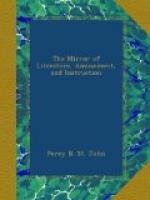* * * * *
PARR’S PUNNING.
Of all the species of wit, punning was one which Dr. Parr disliked, and in which he seldom indulged; and yet some instances of it have been related. Reaching a book from a high shelf in his library, two other books came tumbling down; of which one, a critical work of Lambert Bos, fell upon the other, which was a volume of Hume. “See!” said he, “what has happened—procumbit humi bos.” On another occasion, sitting in his room, suffering under the effects of a slight cold, when too strong a current was let in upon him, he cried out, “Stop, stop, that is too much. I am at present only par levibus ventis.” At another time, a gentleman having asked him to subscribe to Dr. Busby’s translation of Lucretius, he declined to do so, saying it would cost too much money; it would indeed be “Lucretius carus.”—Field’s Memoirs.
* * * * *
HOUBRAKEN’S HEADS.
Houbraken, as the late Lord Orford justly observes, “was ignorant of our history, uninquisitive into the authenticity of the drawings which were transmitted to him, and engraved whatever was sent;” adducing two instances, namely, Carr, Earl of Somerset, and Secretary Thurloe, as not only spurious, but not having the least resemblance to the persons they pretend to represent. An anonymous but evidently well informed writer (in the Gentleman’s Magazine) further states, that “Thurloe’s, and about thirty of the others, are copied from heads painted for no one knows whom.”—Lodge’s Illustrated Biography.
* * * * *
VIRGIL’S GEORGICS.
Every reader of taste knows that “glance from earth to heaven” which pervades the Georgics throughout, and that poetical almanack which the poet has made use of for pointing out the various seasons for the different operations of husbandry. Will it be believed that his Spanish translator has actually taken the trouble to convert these indications into days of the month, and inserted the result of his labours in the text?
* * * * *
WOMAN’S EYE.
The light that beams from woman’s
eye.
And sparkles through her tear,
Responds to that impassion’d sigh
Which love delights to hear.
’Tis the sweet language of the soul,
On which a voice is hung,
More eloquent than ever stole
From saint’s or poet’s
tongue.
Forget Me Not—1829.
* * * * *
“NIMIUM NE CREDE COLORI.”
Jack Taylor once said to a water-drinking person, with a purple face, “better things might prima facie be expected.”




